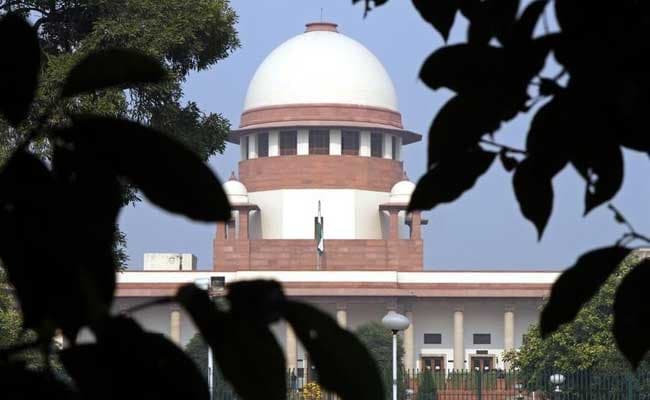
New Delhi:
Courts cannot take away the statutory powers of the Centre and the states to grant remission to convicts, two judges of the Supreme Court said on Wednesday in a dissenting verdict.
Justices UU Lalit and AM Sapre, who concurred with other three judges led by Chief Justice HL Dattu on six questions arising out of Tamil Nadu government's decision to free killers of Rajiv Gandhi, differed on the issue and said the courts cannot quantify the jail term leading to a situation where Executive is stopped from exercising their power of remission provided under CrPC.
"In our view, it would not be open to the court to make any special category of sentence in substitution of death penalty and put that category beyond application of remission, nor would it be permissible to stipulate any mandatory period of actual imprisonment inconsistent with the one prescribed under Section 433A of CrPC," Justice Lalit, who wrote 80-page long separate judgement, said.
The verdict also said that the life imprisonment "means imprisonment for the rest of life or the remainder of life of the convict".
However, such a convict can "always apply for obtaining remission" either under the provisions of the Constitution or under CrPC and "the authority would be obliged to consider the same reasonably".
The three other judges namely CJI Dattu and justices FMI Kalifulla and PC Ghosh upheld the principles enunciated in the Swamy Shraddananda judgement which had said that "a special category of sentence may be made for very few cases where the death penalty might be substituted by the punishment of imprisonment for life or imprisonment for a term in excess of 14 years" and they can put beyond the power of remission of the executives.
Referring to the Shraddananda judgment, the majority view said that courts can ignore remission right in heinous crimes like mass murder and terrorism by awarding sentences ranging from 20 to 40 years unless it is not rarest of rare offences emitting death sentence.
"We hold that the ratio laid down in Swamy Shraddananda that a special category of sentence, instead of death can be substituted by the punishment of imprisonment for life or for a term exceeding 14 years and put that category beyond application of remission is well-founded and we answer the said question in the affirmative," the majority judgement said.
Justices UU Lalit and AM Sapre, who concurred with other three judges led by Chief Justice HL Dattu on six questions arising out of Tamil Nadu government's decision to free killers of Rajiv Gandhi, differed on the issue and said the courts cannot quantify the jail term leading to a situation where Executive is stopped from exercising their power of remission provided under CrPC.
"In our view, it would not be open to the court to make any special category of sentence in substitution of death penalty and put that category beyond application of remission, nor would it be permissible to stipulate any mandatory period of actual imprisonment inconsistent with the one prescribed under Section 433A of CrPC," Justice Lalit, who wrote 80-page long separate judgement, said.
The verdict also said that the life imprisonment "means imprisonment for the rest of life or the remainder of life of the convict".
However, such a convict can "always apply for obtaining remission" either under the provisions of the Constitution or under CrPC and "the authority would be obliged to consider the same reasonably".
The three other judges namely CJI Dattu and justices FMI Kalifulla and PC Ghosh upheld the principles enunciated in the Swamy Shraddananda judgement which had said that "a special category of sentence may be made for very few cases where the death penalty might be substituted by the punishment of imprisonment for life or imprisonment for a term in excess of 14 years" and they can put beyond the power of remission of the executives.
Referring to the Shraddananda judgment, the majority view said that courts can ignore remission right in heinous crimes like mass murder and terrorism by awarding sentences ranging from 20 to 40 years unless it is not rarest of rare offences emitting death sentence.
"We hold that the ratio laid down in Swamy Shraddananda that a special category of sentence, instead of death can be substituted by the punishment of imprisonment for life or for a term exceeding 14 years and put that category beyond application of remission is well-founded and we answer the said question in the affirmative," the majority judgement said.
Track Latest News Live on NDTV.com and get news updates from India and around the world

